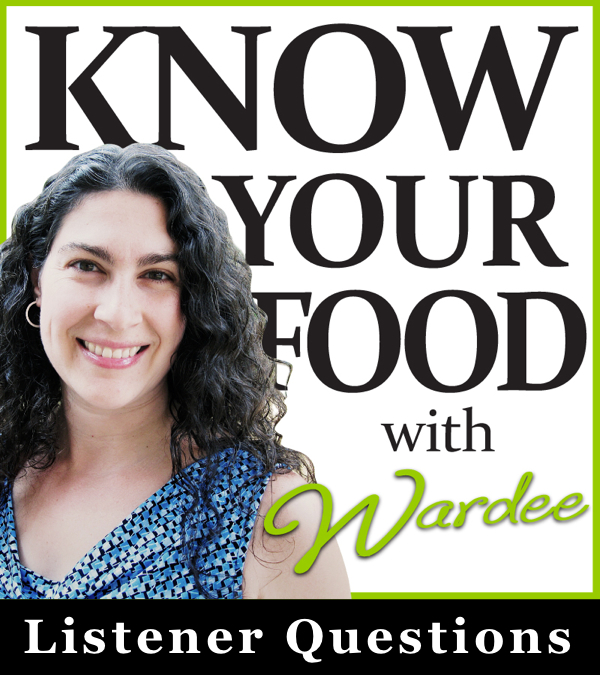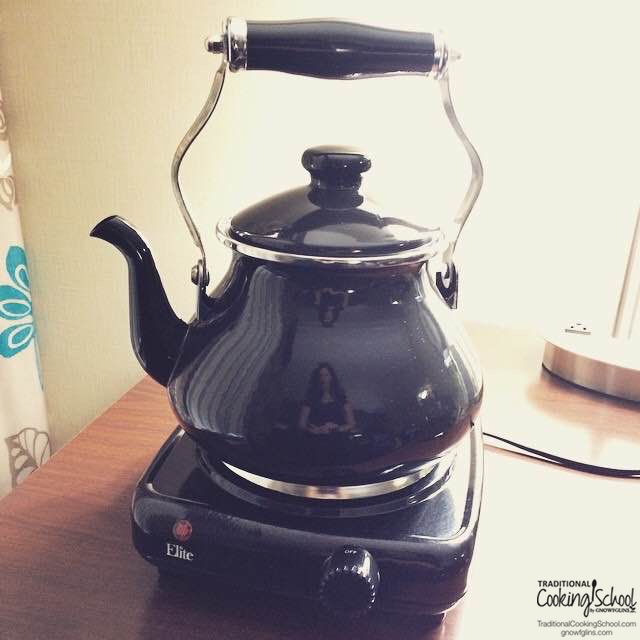
I’m back answering listener questions. I don’t know what I would do without all of you. It’s truly a blessing to hear from you and be able to help you figure out this thing we embrace called Traditional Cooking. Thanks for honoring me with your trust. I hope you find today’s episode (and the answers) helpful on your journey.
Here are the questions I’m answering:
- why are there differing sourdough starter amounts in bread recipes
- how to store extra-vinegary kombucha
- can I use Kombucha instead of lemon juice or vinegar when making broth
- problems with starting a sourdough starter with einkorn
- does sourdough turn bread into gluten-free
- the best flours for sourdough
- different types of flour and what they work for
- whether or not to eliminate grains for gut healing
All the answers are in this episode, and any links mentioned are below. Plus… the tip of the week!
Won’t play for you? Try here. Mobile or desktop users, you can hear my podcast with Stitcher, on-demand and on-the-go. (What’s Stitcher?) You can also get it on iTunes or subscribe in the Podcasts app.
Tip of the Week: Travel with a Hot Plate and Kettle for Healthful Beverages

I took a recent trip up to Washington for a few days and I decided that while I would keep up my usual hydration habits (very important, especially when traveling!), it would not be with municipal water. So… I purchased a hot plate and tea kettle at a store nearby to my motel — along with spring water.
We’ll be able to take the hot plate on future trips, too! When I have to fly, I can pack a smaller kettle (an Arabic coffee pot) in my suitcase as well as the flat and easily fittable hot plate.
Listener Questions
Maria A. asks:
“Hi, Wardee, I printed off your Spelt Sourdough Bread recipe that requires 3 cups of sourdough starter. I am confused why some sourdough recipes only use 1/4 of a cup, others use as little as 50 grams, while the amount of the flour used is pretty much the same? The amount of sourdough starter seems to be all over the place depending on who’s recipe it is. I trust you opinion and would appreciate you telling me how to know how much starter and why there is such a variance.“
Links:
Michelle from Indiana asks:
“Hi, Wardee, I really appreciate your website, podcast and all the work you are doing. I have a question about Kombucha. fermented too long and now tastes like vinegar. Using it like vinegar. Used it in roasted red pepper hummus and it was delicious. How do I store it? Leave it in pantry like apple cider vinegar or refrigerate it? My second question is: I remember you saying you can use kombucha instead of lemon juice or vinegar when soaking grains and beans. Can I also use it in bone broth instead of vinegar? I know the probiotics will be destroyed with the heat but is it vinegary enough to pull the minerals out of the bone?“
Links:
Want to make your own Kombucha at home, but need a scoby (starter)? Here’s the one we recommend.
Amelia from New Jersey asks:
“Hi, Wardee, Having a problem with starting a sourdough starter. I tried it once and it worked fine but doesn’t work with sprouted wheat or einkorn flour. They bubble for a few days but never grow. After 6 days not getting anywhere and throws it out. What is happening? What am I doing wrong?“
Links:
Angelica B. asks:
“Hi, Wardee, Does sourdough make gf for gaps? Is it candida safe as well? We also grind our own flour (mainly corn to avoid the gluten) but if the sourdough will help this issue we also wonder what TYPE of whole wheat? Such as white winter wheat, or hard red spring wheat, etc. We are looking into spelt and rye as well but it seems there are so many different types of wheat what would be the best ‘all around’ flour for sourdough? I think this would make a great post, going into the different types of wheat 😀“
Links:
- Gluten-Free: Fad or Necessity
- Sharon Kane’s Art of Gluten-Free Sourdough Baking
- Are Grains Okay When Healing Your Gut? by nutritional therapist Lydia Shatney (see excerpt below)
“Carbohydrates are hard to digest even for those with a healthy gut, so it stands to reason that those with digestive issues have a harder go of it. As a population, we have become more and more intolerant of carbs; nowadays even properly prepared grains are difficult for a damaged gut to handle.Ancient, soaked, or sprouted grains may be tolerable at first, but in time, if the gut is damaged and candida, yeasts, or bacteria are present, healing will be prevented and further damage is unavoidable.
If your gut is damaged, I recommend you eliminate all grains from your diet for at least three months. Elimination diets are the most straightforward way to pinpoint the foods that affect your health and how they do it.
Usually, properly prepared grains can be added back to the diet eventually — but everyone is different and healing times will vary. Some people may find that excluding grains for the most part, with occasional consumption (such as holidays, birthdays, etc.), goes a long way to improving digestive issues and overall health.
Given the evidence, it is a good idea to remove most carbohydrates in order to heal the gut. Ultimately, however, the choice is yours.”
iTunes
I’m so grateful when you visit my show on iTunes and leave a rating and/or review! KnowYourFoodPodcast.com/iTunes This helps me make my podcast better and also helps others find it. Thank you! For past or current episodes, check out the Know Your Food with Wardee podcast archives.
Anything to Add?
I would love to hear from you! Do you have questions for me, or comments about anything shared in this episode?
Like this podcast? Please help me reach others by using the share buttons at the top of this post. Thanks!
We only recommend products and services we wholeheartedly endorse. This post may contain special links through which we earn a small commission if you make a purchase (though your price is the same).


Hi Wardee!
Thanks so much for your response! You completely answered my questions! We are not celiacs but have some issues with conventional gluten and do better when we do a paleo diet (eliminating all grains). BUT we really like bread, pastries (I love to bake) tortillas (wonderful crepes/tortilla recipe you have!) so we want to introduce home made bread and so far everything seems to be going great! Now I just need to figure out how to get my bread to rise! Your website encouraged my to try and introduce the grains back into our diet, with moderation of course, and it has been such a great resource. Thanks again so much!